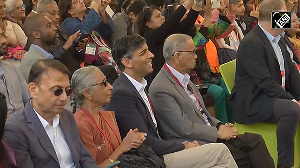Underlining the need to step up regional co-operation and trade particularly in energy and telecom sectors, India and Australia agreed on Wednesday to work together for the implementation of the Doha Development Agenda.
This was part of the agreed minutes signed in New Delhi by Australian Trade Minister Mark Vaile and India's Commerce and Industry Minister Arun Jaitley at the conclusion of the Eighth India-Australia Joint Ministerial Commission.
The two sides also agreed to consider an agreement for cooperation in the telecom sector, develop an action plan to boost tourism and revise agreements to step up educational exchanges.
While sharing similar concerns at the high level of trade distorting agricultural support and protection by the developed countries, the two also expressed concern at the lack of consensus on Trade Related Intellectual Property Rights and public health at the World Trade Organisation.
Reiterating their commitment to retaining special and differential treatment for developing countries, the two sides agreed to work together for the implementation of the Doha Development Agenda without dilution.
Speaking to reporters in New Delhi, Vaile said, Australia was particularly keen to step up cooperation in the energy sector, which included bio-diesel, LNG and coal.
Referring to his meeting on Tuesday with the Petroleum Minister Ram Naik, he said that both countries had a shared interest in promoting ethanol-blended fuels as an environment friendly fuel alternative.
He said there were opportunities for cooperation in coal technology where Australia has an expertise.
Vaile said a high level official team from the Australian bio-security agency would visit India in April this year to address concerns of quarantine and certification.
It was also agreed that the two countries would examine the possibility of expanding scope of the present agreement for fish and fisheries products between the Export Inspection Council and the Australian Quarantine and Inspection Service to include items like honey, tea, cashew, milk products, basmati rice, spices, egg products, poultry and meat products.
The Joint Working Group on energy and minerals also identified several areas of cooperation such as participation in bids for petroleum exploration, assistance in exploration of hydro potential in Himalayas, regulatory reforms in energy sector, supply of LNG on a reliable and cost competitive basis, supply of coal to power stations, coal mining and clean coal technologies.
The Working group on Fibres and Textiles also presented its report identifying areas with potential for enhanced cooperation.
Sources said the two sides identified four projects for cooperation in the textiles sector - research in wool blends, study of the supply chain of raw wool exported from Australia to India, education and training and design and product development.
While no targets have been set to step up the bilateral trade from the present level of $1.7 billion in 2001-02, both sides agreed that the private sector would have to take the initiative to undertake investments in the potential sector to boost trade.
It was noted that in the last 11 years ending October 2002, a total of 7,500 FDI proposals had been approved amounting to $2 billion.
The two sides agreed to hold the next meeting in Australia in 2004 on a mutually convenient date.






 © 2025
© 2025